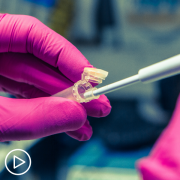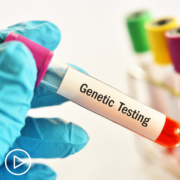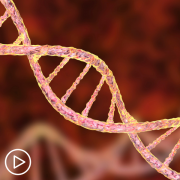What Questions Should Metastatic Breast Cancer Patients Ask Before Starting a Treatment Plan?
What Questions Should Metastatic Breast Cancer Patients Ask Before Starting a Treatment Plan? from Patient Empowerment Network on Vimeo.
Before metastatic breast cancer treatment begins, it’s important to speak up and ask questions. Expert Dr. Sarah Sammons shares key questions patients should ask to ensure a personalized approach to their care and treatment.
Dr. Sarah Sammons is an oncologist at Duke Cancer Institute and Assistant Professor of Medicine at Duke University School of Medicine. Learn more about Dr. Sammons here.
See More From INSIST! Metastatic Breast Cancer
Related Resources:

Which Metastatic Breast Cancer Treatment Is Right for You? Guide |

|

Key Considerations When Making Metastatic Breast Cancer Treatment Decisions |
Transcript:
Katherine:
What key questions do you think patients should ask about their proposed treatment plan, to make sure they’re getting the most personalized approach for their disease?
Dr. Sammons:
That’s a great question. So, first and foremost – when you get an initial diagnosis of metastatic breast cancer, it can be nearly debilitating mentally at first, so it’s a little bit hard to be an advocate for yourself.
But it is so important, eventually, to become an advocate for yourself and the first thing that I would say is it’s very important that you have had a biopsy of a metastatic site. So, if something shows up on a scan that looks abnormal – maybe a liver legion or a lung legion – it’s very important that that area is biopsied and checked again for estrogen, progesterone, and HER2. And the reason for that is – there’s a phenomenon called subtype switching. So, a patient can – maybe her early-stage breast cancer was estrogen receptor-positive. There’s a 15 to 20 percent chance that her metastatic disease could be estrogen-negative, and it’s critical that we know what the estrogen and the HER2 are, so that we can treat them with the initial best treatments.
So, that’s number one. I think it’s very important to have a biopsy of your metastatic site, to repeat that estrogen and HER2.
Next, pretty important to have had at least germline BRCA testing. And the reason for that is: We now have drugs, the PARP inhibitors that I talked about before, that specifically benefit patients that have a BRCA mutation.
And then, the next would be – is there a role for next generation sequencing, which is the somatic gene testing of the patient’s tumor.
I would say practice patterns differ. For HER2-positive breast cancer, it’s probably not important to have that upfront because we have a very – it’s critical that we know that you’re HER2-
positive, so that we can give you those best HER2 targeted therapies in the first few lines. But we’re really not going to use that genomic sequencing information for really the first couple of years in metastatic, HER2-positive breast cancer.
For hormone receptor-positive breast cancer, I do think it’s pretty important to know what your genomic testing is – your next generation sequencing is – upfront. If you have an ESR1 mutation, then we know that you’re resistant to certain types of endocrine therapy, and we would not give you them. If you have a PI3-Kinase, then we would give you that if you qualified, otherwise we would give you that drug that targeted the PI3-Kinase mutation probably in the second line.
So, next generation sequencing is pretty important, either in first or second line, in hormone receptor-positive breast cancer.
Triple-negative breast cancer – the most important thing upfront is to know what your PDL1 status is. And it’s very important that if you’re PDL1-positive, you get immunotherapy with your first treatment because we know that immunotherapy, if you get it in later lines of treatment, does not work as well as if you get it in the first line.
So, it’s always really tough for patients to wait a couple weeks to get started on treatment, but as long as your disease is not growing so rapidly that your physician is concerned, which is on the rare end, it’s good to get all your ducks in a row, get all of the information that you need, so that you can be started on the best treatment.
Katherine:
Dr. Sammons, why should patients feel like they should speak up and that they have a voice?
Dr. Sammons:
Patients should feel like they should speak up and have a voice because this is their life. This is your life. This is your treatment. This is – nobody is going to advocate for you as well as yourself. If you’re lucky, you’ll find a physician that is an advocate, and many of us are, but nobody will advocate for you as well as you will advocate for yourself. So, that’s reason number one.
And reason number two would be: we’re all humans. Your doctors are humans. Some physicians, especially physicians in the community, may not only treat breast cancer. They may treat every single type of cancer, and it’s very hard to stay specifically on top of all of the new drugs and new options coming out in every tumor type; it’s virtually impossible.
So, I just think it’s important to be an advocate. Never be afraid to ask a question. Most physicians should not feel threatened by that. We like a patient to be engaged. So, never worry or be fearful about that.










